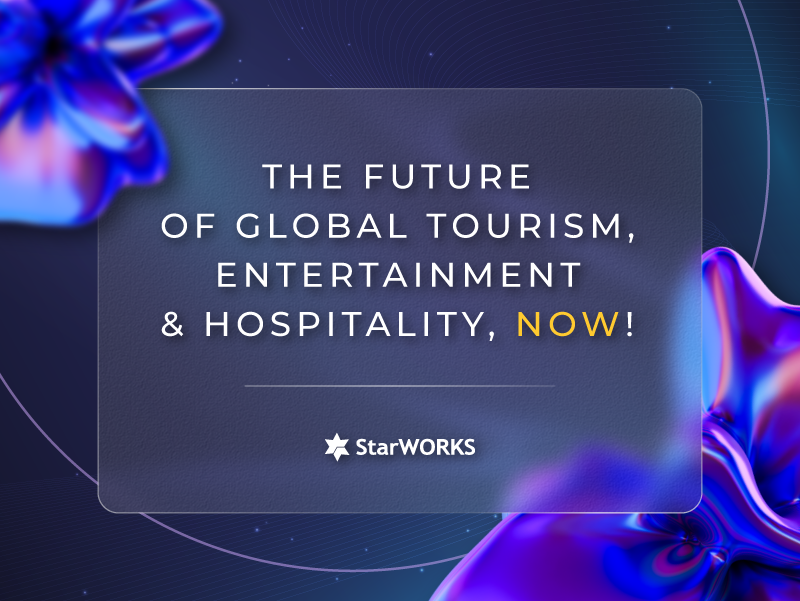Key Takeaways:
- The global tourism, entertainment, and hospitality industry is facing a challenging time due to the COVID-19 pandemic, with many businesses struggling to survive
- The COVID-19 pandemic has forced the tourism, entertainment, and hospitality industry to adapt to new safety measures and innovate new ways to attract customers.
- Industries began implementing technology such as Virtual Reality (VR) and Augmented Reality (AR) to enhance the guest experience and provide alternatives to physical travel.
- Blockchain technology enables tourists and consumers to access information about sustainable activities, accommodations, and products while providing feedback and ratings to incentivise businesses to adopt sustainable practices.
- Archaic or traditional membership programs are still the challenges that the industry will face in the future.
- The future of membership programs is more than just exclusive perks. It also provides more personalised experiences to members, offering diverse benefits and perks catering to each member's interests.
- StarWORKS Global is using innovative blockchain technology through the StarPOINTS rewards program to reshape the future of the global tourism, entertainment, and hospitality industry.
- StarWORKS Global announces the future of an exclusive membership program called StarWORLD Club.
- What sets StarWORLD Club apart from other membership programs is its income-generating token, StarIGT. This innovative token represents each particular membership in the club with its attendant privileges and benefits.
As we stand on the brink of a new era, the global tourism, entertainment, and hospitality industries are about to undergo a major transformation. The rise of blockchain technology is creating new opportunities for businesses to streamline their operations and provide better services to their customers.
At the forefront of this revolution is StarWORKS Global, a blockchain company that is leading the charge in developing cutting-edge solutions for these industries. Let’s explore the future of global tourism, entertainment, and hospitality and how StarWORKS Global is paving the way for the future of the industries now!
A Brief Overview of the Changes and Challenges the Industry has Faced in the Past

A Brief Overview, photo by Pexels
The tourism, entertainment, and hospitality industries have been facing constant changes and challenges for decades. In the past, the industry has witnessed numerous events that have significantly impacted its growth and development. From economic recessions and natural disasters to pandemics and political instability, the industry has been tested time and time again.
Despite these challenges, the industry has always adapted and reinvented itself to stay relevant and attractive to consumers.
Current State of Global Tourism, Entertainment & Hospitality

Current State, photo by Pexels
Over the years, the global tourism, entertainment, and hospitality industry has experienced significant growth and development. Recently, the industry has emerged as a crucial sector of the global economy, playing a substantial role in generating employment opportunities and economic growth.
According to recent reports, the industry's contribution to the global economy was estimated at around $8.8 trillion in 2019. The industry has continued to grow despite challenges such as the global economic recession, natural disasters, and pandemics.
In terms of tourism, international tourist arrivals reached 1.5 billion in 2019, representing a 4% increase from the previous year. The entertainment industry has also experienced significant growth, with the global box office revenue reaching $42.2 billion in 2019. On the other hand, the hospitality industry has seen a steady increase in revenue, with the global hotel industry generating $570 billion in revenue in 2019.
United Nations World Tourism Organisation (UNWTO) dataAccording to the latest data from the United Nations World Tourism Organisation (UNWTO), international tourist arrivals are expected to reach approximately 1.4 billion by 2022. This would represent a significant rebound from the pandemic year of 2020, which saw a 73% decrease in international tourist arrivals compared to 2019.
Analysis of current trends in the travel and entertainment, and hospitality industry
One major trend that has emerged in recent years is the rise of experiential travel, where travellers seek unique, authentic, and personalised experiences. As we will discuss later, this has led to a growing demand for niche tourism offerings, such as virtual tours.
Apart from experiential travel, the industry has also experienced a surge in digital entertainment platforms. With the rise of streaming services and social media, consumers have more options than ever before for accessing entertainment content. As a result, traditional media companies have to adapt to this new reality and find ways to remain relevant in the digital age.
Discussion of how the industry has adapted to the COVID-19 pandemic
The COVID-19 pandemic has greatly impacted the tourism, entertainment, and hospitality industry. With travel restrictions, lockdowns, and social distancing measures in place, many businesses in the industry were forced to shut down or drastically change their operations.
According to the World Travel and Tourism Council, the industry's contribution to the global GDP fell by 49.1% in 2020, with a loss of around 62 million jobs worldwide during the COVID-19 pandemic. The economic impact of the pandemic has been particularly hard on small businesses and those in developing countries that heavily rely on tourism for their economy.
Despite the challenges, the industry has adapted to the new normal. Hotels and resorts have implemented enhanced sanitation measures and contactless technologies, such as mobile check-ins and payments. Restaurants and bars have shifted to outdoor dining and takeaway services. Theme parks and attractions have limited capacity and introduced virtual queues to minimise physical contact.
In addition, the industry has also turned to new technologies such as virtual reality and augmented reality to enhance the guest experience and provide alternatives to physical travel. Many companies have also embraced remote work and virtual events to maintain operations and keep employees and customers safe.
The Future of Global Tourism, Entertainment & Hospitality Industry

The Future, photo by Pexels
As the global tourism, entertainment, and hospitality industry continues to adapt and evolve in response to changing circumstances, it's clear that the future is full of potential and possibilities. From advancements in technology to new and exciting destinations, there are many reasons to be optimistic about the direction of the industry. So what can we expect in the coming years? Let's take a closer look at the future of global tourism, entertainment, and hospitality.
Impact of Technology on the Industry
The impact of technology on the tourism, entertainment, and hospitality industry cannot be overstated. With the increasing use of smartphones, tablets, and other devices, how people travel, and experience entertainment has changed drastically.
As we mentioned before, the industry has had to keep up with the changing times by adopting new technologies such as mobile apps, virtual reality experiences, and social media marketing. These technologies have helped businesses to engage with their customers in new and innovative ways, improve their services, and increase efficiency.
For instance, mobile apps can be used to book flights and accommodation, while virtual reality can be used to showcase destinations and experiences to potential customers. Most importantly, the industry has also been exploring the use of blockchain technology to improve security, transparency, and data management.
As the use of technology continues to evolve, it is clear that the tourism, entertainment, and hospitality industry will need to continue to adapt and innovate to stay relevant and competitive.
How sustainability will affect the industry's future
As we know, the industry is highly dependent on natural resources and the environment, making it crucial for the industry to prioritise sustainability. With growing concerns about climate change and environmental degradation, consumers increasingly demand sustainable practices from the industry.
In response, companies are reducing their carbon footprint and implementing sustainable practices in their operations. This includes reducing energy consumption, managing waste more effectively, and adopting environmentally friendly technologies.
Sustainability will also have a significant impact on the industry's bottom line. Consumers become more environmentally conscious and increasingly willing to pay more for sustainable products and services. Companies prioritising sustainability can differentiate themselves from their competitors and attract a growing market of environmentally conscious consumers.
Blockchain technology as a solution for sustainability issues within the industry
Blockchain technology is known for its secure, decentralised, and immutable properties, making it a promising solution for sustainability issues in the tourism, entertainment, and hospitality industry. One potential application of blockchain is the use of smart contracts, which can facilitate automated and transparent transactions between different parties in the industry. This could include contracts for sustainable supply chains, carbon credits, and energy consumption.
Furthermore, blockchain can also be used to create a decentralised platform for sustainable tourism and entertainment initiatives. This platform would enable tourists and consumers to access information about sustainable activities, accommodations, and products while providing feedback and ratings to incentivise businesses to adopt sustainable practices.
Opportunities and Challenges in the Industry's Future

Opportunities and Challenges, photo by Pexels
As we look ahead to the future of the tourism, entertainment, and hospitality industry, it is clear that there will be both opportunities and challenges to navigate. With changing consumer trends, technological advancements, and growing concerns around sustainability, the industry must adapt and evolve to stay relevant. Down below, we will explore the industry's potential opportunities and challenges in the years to come.
Potential opportunities for growth and development in the industry
According to a report by MarketsandMarkets, the blockchain market in the travel and hospitality industry is projected to grow from $431.0 million in 2018 to $3,054.5 million by 2023, at a CAGR of 48.8% during the forecast period. This growth is expected to be driven by the increasing need for transparency and immutability in travel and hospitality operations, which blockchain technology can provide.
To support the potential opportunities for growth and development in the industry, according to a report by Allied Market Research, the global blockchain market in the travel and hospitality industry was valued at $61.5 million in 2018 and is expected to reach $1,541.8 million by 2025, growing at a CAGR of 76.3% from 2018 to 2025. This significant growth indicates the increasing adoption of blockchain technology in the industry and its potential to revolutionise business operations.
Furthermore, a survey conducted by Deloitte revealed that 95% of respondents in the travel industry agreed that blockchain could help to reduce costs, while 87% believed it could increase efficiency. These statistics demonstrate the promising future for blockchain in the industry and the potential opportunities for growth and development.
Challenges that the industry may face in the future
One challenge that the industry may face in the future is the implementation and integration of blockchain technology. While blockchain has the potential to revolutionise the industry by enabling secure and transparent transactions, there are also challenges associated with its adoption.
One issue is the lack of awareness and understanding of blockchain technology among industry professionals, which could slow its adoption. Additionally, there are concerns about the scalability of blockchain systems, particularly in handling high-volume transactions such as those in the hospitality industry.
However, the growth of blockchain-based rewards programs and loyalty schemes, which can incentivise customers and provide valuable data insights to businesses, suggests significant potential for blockchain in the industry. With careful planning and investment in research and development, blockchain could become a key driver of growth and innovation in the tourism, entertainment, and hospitality industry.
Another challenge that the industry may face is the archaic or traditional membership programs. While traditional membership programs have successfully created brand loyalty, they have limitations in data tracking and customer engagement. However, with the integration of blockchain technology, membership programs have the potential to offer more personalised experiences and greater transparency.
Future of Membership Programs: It is More than Just Exclusive Perks
Membership programs have been around for decades, providing exclusive perks and benefits to those who join. From airline frequent flyer programs to premium credit cards, membership programs have become a staple of modern life. However, the future of membership programs is changing, and it's not just about offering exclusive perks anymore.
As we mentioned before, one of the key drivers of this change is the rise of blockchain technology. Blockchain allows membership programs to create a secure and transparent platform where members can interact with each other and share ideas. This technology also allows membership programs to reward members for contributing to the community, creating a sense of shared ownership and responsibility.
Membership programs are evolving to provide more personalised experiences as members now seek tailored services that meet their needs and preferences. The focus is on ensuring that each member feels valued and appreciated by the program. It means membership programs are becoming more flexible, offering diverse benefits and perks catering to each member's specific interests.
How StarWORKS Global Reshapes the Future of the Global Tourism, Entertainment, and Hospitality Industry

How StarWORKS Global reshape the future, photo by Pexels
Here at StarWORKS Global, we aim to reshape the global tourism, entertainment, and hospitality industry's future by leveraging blockchain technology's power. We believe that the industry faces numerous challenges, such as the need for more sustainable practices, improving customer experiences, and providing better rewards programs.
Introducing StarPOINTS: Blockchain-Based Rewards Program
One of the ways that StarWORKS Global addresses these challenges is by providing StarPOINTS. This blockchain-based platform enables restaurants, hotels, resorts, airlines, and other businesses in the industry to offer rewards programs to their customers. These rewards programs are designed to provide customers with a more engaging and satisfying experience while increasing customer loyalty and retention.
Sustainability of the StarPOINTS Rewards Program
Sustainability is not just limited to environmental impact but also ensures the longevity of the rewards program. In this regard, StarWORKS Global's blockchain-based solution can also help ensure the sustainability of the rewards program by providing transparent and auditable tracking of rewards points earned and redeemed via the integration with the StarWALLET digital wallet.
Additionally, StarWORKS Global's platform can facilitate collaboration and partnerships between businesses in the industry to drive innovation and sustainable growth. By connecting businesses across the industry, StarWORKS Global can foster a more cohesive and collaborative ecosystem, leading to new ideas and solutions that benefit both the industry and the environment.
Overall, StarWORKS Global's blockchain-based solution can play a key role in reshaping the global tourism, entertainment, and hospitality industry's future by addressing sustainability challenges and providing innovative solutions for businesses to adapt and thrive in the ever-changing industry landscape.
Unlock the Future of Exclusive Membership with StarWORLD Club
StarWORLD Club is a business and social organisation owned and managed primarily for the benefit of its members. As a member, you get access to a wide range of benefits, including networking events, business support, and exclusive travel opportunities.
StarIGT as the Part of StarWORLD Club
But what sets StarWORLD Club apart from other membership programs is its income-generating token, StarIGT. This innovative token represents each particular membership in the club with its attendant privileges and benefits. And as the name suggests, StarIGT is an income-generating asset that provides members with a share of the club's profits.
With StarIGT, members can enjoy the benefits of owning an asset that generates income while gaining exclusive access to the club's many offerings. It's the future of membership programs, where membership isn't just a status symbol but a means to generate income and build social connections.
